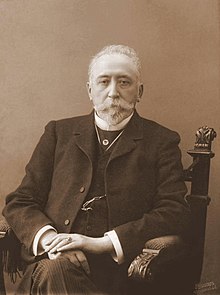Mikhail Nikolayevich Galkin-Vraskoi
Mikhail Nikolayevich Galkin-Wraskoi ( Russian Михаил Николаевич Галкин-Враской ; born September 17, jul. / 29. September 1832 greg. In Kazan ; † April 8 jul. / 21st April 1916 greg. In Saint Petersburg ) was a Russian lawyer , Civil servant and author in the Russian Geographical Society .
Life
Galkin-Vraskoi, son of the middle-class grammar school director Nikolai Ivanovich Galkin and the noble Nadezhda Nikolayevna Vraskoi, graduated from the Faculty of Law at Kazan University . He remained loyal to the city of Kazan until the end of his life - for example he was a member of the Kazan Society of Anti-Alcoholics . At first, Mikhail Galkin-Wraskoi worked as an official in the Orenburg governorate . In 1858/1859 he took part in a Russian expedition to Khiva and Bukhara . He got to know Turkmenistan . For his ethnographic and historical materials , published in book form on this region and Central Asia in 1868 , he was awarded a silver medal by the Russian Geographical Society.
In 1862/1863 Mikhail Galkin-Wraskoi studied penal systems in Western Europe. His writing resulting from that stay abroad remained for a long time the standard work for prison practice in Russia. In particular, the author favored the prisoners' paid work as therapy. After returning to Russia, Mikhail Galkin-Vraskoi continued to work under Interior Minister Count Valuev on reforming the penal system - including in military prisons . He created and ran a model prison in which prisoners worked in manual trades. At the same time he remained connected to Central Asia; so he took care of the administration of Kyrgyzstan and Turkestan .
From October 11, 1868 to September 25, 1870 he was in Reval governor of Estonia and from October 4, 1870 to April 23, 1879 in Saratov governor of the governorate of the same name . From 1879, Mikhail Galkin-Wraskoi headed the newly created Russian General Directorate for Prisons and worked in this authority as a reformer. For example, he appointed prison inspectors in twenty provinces and installed the necessary local authorities. He traveled twice to Siberia to inspect and prepared extensive material for the abolition of exile in Siberia. The project was never realized.
From 1896 until his death, Mikhail Galkin-Wraskoi was a member of the Russian State Council . Three months before his death, he received the highest Russian honor - the Order of St. Andrew the First Called .
family
Mikhail Galkin-Vraskoi was married to Nadezhda Alexandrovna (1839–1864), the daughter of the Kiev Governor General Alexander Pavlovich Besak. Their only son Nikolai was only three years old. The entire family is buried in the cemetery of the Sergius monastery in Strelna .
Other medals
russian
- Order of Saint Anne
- Order of Saint Stanislaus
- Order of Saint Vladimir
- Imperial-Royal Order of the White Eagle
- Alexander Nevsky Order
foreign
- Officer of the Legion of Honor
- Order of the Sun and Lion
- Order of the Crown of Italy
- Oldenburg House and Merit Order of Duke Peter Friedrich Ludwig
- Order of the Redeemer
- Order of the Zähringer Lion
- Frederick Order
- Royal Order of Cambodia
- Dannebrogorden
- Order of the Red Eagle
- Ordre des Palmes Académiques
Honor
- Honorary citizen of Saratov and Arkhangelsk .
- Today's Dolinsk was called Galkino-Vrasskoye from 1884.
Web links
Individual evidence
- ↑ Russian Первая Казанская мужская гимназия
- ↑ Russian noble family Врасские
- ↑ Russian Казанское общество трезвости
- ↑ Russian Закаспийская область
- ↑ Russian Этнографические и исторические материалы
- ↑ Russian book 1868 , see also entry in HathiTrust
- ↑ Russian exile to Siberia
- ↑ Russian Безак, Александр Павлович
- ↑ Russian Сергиева Приморская пустынь
| personal data | |
|---|---|
| SURNAME | Galkin-Wraskoi, Mikhail Nikolajewitsch |
| ALTERNATIVE NAMES | Галкин-Враской, Михаил Николаевич (Russian) |
| BRIEF DESCRIPTION | Russian lawyer, civil servant and author |
| DATE OF BIRTH | September 29, 1832 |
| PLACE OF BIRTH | Kazan |
| DATE OF DEATH | April 21, 1916 |
| Place of death | St. Petersburg |
